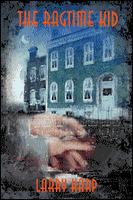 It could safely be called ahead of its time. Scott Joplin’s opera Treemonisha was hailed as a masterpiece when it was finally performed in its entirety. Unfortunately, that was in 1972, well after the death of the composer in 1917. However, a young music publisher named Irving Berlin is astute enough to recognize its greatness, despite the commercial limitations that are all too obvious to the Tin Pan Alley song-plugger. Such contrasting musical sensibilities mark the fictional meeting of the two giants of American song in Mark Saltzman’s Tin Pan Alley Rag, now running at the Laura Pels Theatre.
It could safely be called ahead of its time. Scott Joplin’s opera Treemonisha was hailed as a masterpiece when it was finally performed in its entirety. Unfortunately, that was in 1972, well after the death of the composer in 1917. However, a young music publisher named Irving Berlin is astute enough to recognize its greatness, despite the commercial limitations that are all too obvious to the Tin Pan Alley song-plugger. Such contrasting musical sensibilities mark the fictional meeting of the two giants of American song in Mark Saltzman’s Tin Pan Alley Rag, now running at the Laura Pels Theatre.Whether Joplin ever met Berlin seems to be a matter of speculation, but the composer searched high and low for a publisher willing to handle Treemonisha, so Tin’s premise is certainly plausible enough. (Ironically, a ragtime scholar named Edward Berlin would eventually write Joplin’s biography.) As Saltzman’s play opens, the ailing Joplin’s hopes for his masterwork have been dealt yet another setback following a disastrous run-through staged for a prospective investor. Conversely, though Berlin is already at the top Tin Pan Alley publishing, his best years were well ahead of him.
Still, Saltzman finds common experiences that allow the composer-songwriters to convincingly bond during their brief encounter. Both rose from mean circumstances, attaining significant acclaim with their music. More significantly, both still mourn wives who died shortly after their respective marriages. At this point in his life, Berlin still bitterly grieves for his first wife Dorothy Goetz, who contracted typhoid fever on their honeymoon (though he would eventually marry Ellin Mackay, his second wife of sixty-three years). For Joplin it is Freddie Alexander, wife number two out of three (who died while he was on tour), whom he remembers with deep regret.
Saltzman integrates the two composers’ stories quite well and makes excellent use of their songbooks. Musically, Joplin is clearly better represented in Tin, which includes selections from Treemonisha, as well as his best known rags, like “The Entertainer” and “The Maple Leaf Rag.” By contrast, most of the Berlin songs selected are appropriately the corny Tin Pan Alley novelty tunes he was cutting his teeth on at the time.
Cleverly staged, the formative events of the songwriters’ lives unfold out of Berlin’s publishing office thanks to Beowulf Boritt’s inventive set design. Most of the actual singing is left to the fine supporting cast, which notably includes James Judy, (who also appeared in the Off-Broadway musical adaptation of Frank Gilroy’s The Gig, another book musical with jazz-crossover appeal) whose multiples roles include that of the progressive John Stark, Joplin’s first music publisher.
Though his numbers are often comedic and decidedly dated “ethnic” tuners, Michael Therriault has some nice vocal moments as well. More importantly, he has excellent stage chemistry with Michael Boatma
 n as Joplin. As a result, the respect and friendship that develops between them feels natural and convincing.
n as Joplin. As a result, the respect and friendship that develops between them feels natural and convincing.While Tin might overstate the ragtime component of Treemonisha, in most respects, it captures the milieu of early Twentieth Century song-plugging quite well. Repeatedly, Saltzman makes the point that it was the work of Joplin and Berlin, the sons of a slave and a Jewish immigrant, who would finally declare America’s musical independence from Europe. Yet Tin never descends into didacticism. Both well conceived and well intentioned, it is a very entertaining tribute to the men who helped influence the distinctive sounds of American music in the Twentieth Century. Tin’s limited run ends September 6th.
